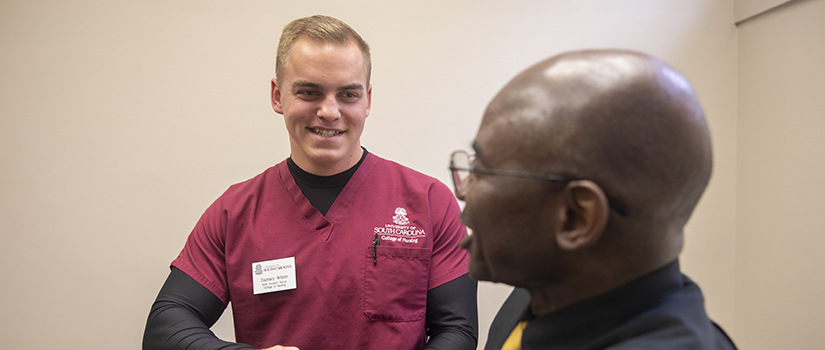Nurses care for patients of all backgrounds, genders, and experiences. It is valuable for a patient to feel represented by their healthcare providers. Male nurses provide a unique perspective and offer a varied set of skills.
Craig Smith, BSN '05.
Current Role: Currently, I’m the director of education and innovation at Kingman Regional Medical Center in Kingman, Arizona. Additionally, I work part-time as online adjunct faculty at Grand Canyon University (GCU) for the RN to BSN program and MSN program focused in Nursing Informatics.
Why did you choose to become a nurse? My mother is now a retired Nurse Practitioner and has been a nurse since 1973. She was a big reason I chose nursing. The other reason was a religious calling. I have wanted to serve God for most of my life and felt caring for others is a wonderful way to live a life that Jesus would approve of.
Why is it important for men to be represented in nursing? I have been a nurse since 1997 and can tell you from experience we need men in nursing. I have worked with men who were former police, paramedics, firefighters and even worked with a male nurse who was former special forces in the military. All I consider heroes. Men in nursing help with strength and a calming presence with patient care. Nurses all know how much manual labor patient care is. I have personally helped and seen other male nurses help calm patients who are aggressive, help with heavy lifting, and help patients who request only a male to care for them. Just like some females want a female caregiver, many men are the same. The variety in nursing helps those we all serve.
What challenges have you faced as a male nurse? The typical stereotype that the media has made for men in nursing. I cannot tell you how many times I’ve had patients tell me I’m too big and strong to be a nurse or ask about my sexual preference. My wife is a nurse, and we have two wonderful boys, so I laugh now.
Jamie Odom, BSN ’17, MSN ‘20
Current Role: Inpatient advanced practice nurse with Lexington Cardiology
Why did you choose to become a nurse? I pursued nursing as a second career in my late twenties. My first career choice was criminal justice, and after my graduation with this degree, I realized that this was not a good fit for me. After being exposed to nurses through personal and family experiences, especially other males who chose this discipline, I began to explore nursing as a potential career opportunity. I have been especially impressed by the varied career options and role opportunities in nursing---all of which have an underlying basis of the science of decision making and caring—to help promote wellness, optimize health, and/or transitioning in the life cycle. With a late start in nursing and an earlier college transcript in my late teens that I had to overcome, I pursued nursing school with a new maturity and a revived “sense of belonging.” Understanding the human body and how it continually strives to maintain homeostasis fascinated me in my early nursing courses. When one system fails, the body finds a way to compensate. With this new knowledge, my worldview expanded with opportunities to influence the future of healthcare whether it was through genetics or by helping to bridge the gap of related health disparities that exist in our Southeastern US region.
Why is it important for men to be represented in nursing? It is important for men to be represented in a historically dominated role by women. Seeing more male nurses in the field will hopefully inspire young men to seek a career in such a rewarding field. Nursing provides us with flexibility, stability, and exponential opportunity for growth.
What challenges have you faced as a male nurse? Overall, I would have to say that men have been well accepted into nursing, but there have been a few challenges with gender stereotypes and lack of male role models in our profession. Most commonly, we are mistaken to be doctors rather than nurses, which may be disheartening, but it does happen less frequently than when I first began my nursing career.
